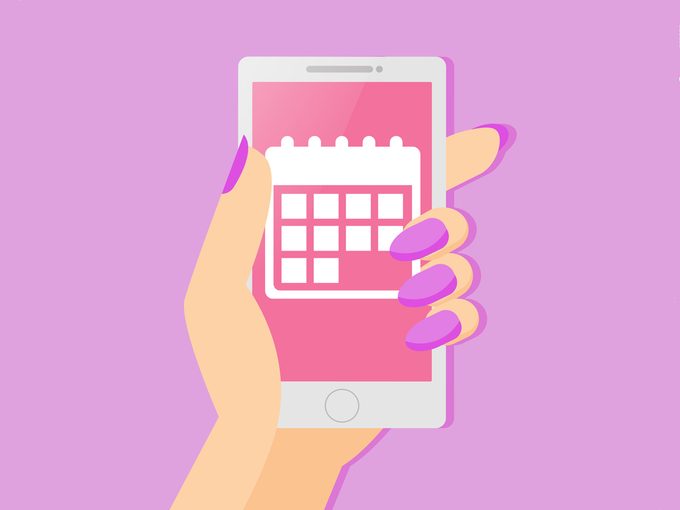Why Women are Ditching The Pill in Favour of Birth Control Apps to Prevent Pregnancy
Thanks to FemTech, period tracking and fertility apps are on the rise to becoming the preferred form of birth control. But are they really effective?

I stopped using birth control pills just over three years ago. After using it consistently for about seven years, I decided to go off of it in an attempt to get my body back to its natural cycle. A few months later, after starting a new relationship, I went back on the pill, but two weeks in, my mood suddenly dipped drastically — something that hadn’t happened during my three or four months off of it. I stopped taking them immediately, and my mood went back to normal.
After a quick Google search and seeing similar stories from women taking the pill, I concluded that oral contraceptives were a big contributing factor to me being diagnosed with clinical depression at the age of 18 — just a few months after going onto the pill for the first time. There are mixed opinions about birth control causing depression — a 2016 Denmark study found that taking hormonal birth control might be associated with an increased risk for depression, while a February 2018 study by researchers from Ohio State Wexner Medical Center found no link between certain types of birth control and depression. However, mood swings, along with other side effects like lowered sex drive, weight gain, headaches, migraines and breast tenderness, are a big reason why more and more women, like me, are choosing to ditch the pill and choose other forms of birth control. And the drop in oral contraceptive usage has been drastic — according to data from health information company QuintilesIMS, Canadian pharmacies dispensed 1.17 million fewer prescriptions for oral contraceptives in 2015 than in 2011.
The Rise of FemTech Used as Birth Control
Other alternatives to oral contraceptives include IUDs (hormonal and non-hormonal), the ring, the patch, hormonal injections and of course, condoms. (Interested in getting an IUD? Here’s how to make IUD insertion hurt less.) But thanks to a rise in FemTech, a category of software, diagnostics, products, and services that use technology to focus on women’s health, period-tracking, ovulation and fertility apps like Clue and Eve by Glow, along with fertility-tracking devices like Daysy and Natural Cycles (the first-ever “digital birth control” app to be approved by the FDA as a form of contraception) are becoming more popular forms of birth control. (Note: though Daysy does not advertise itself as a contraceptive, 80 percent of women who use it do so to prevent pregnancy, according to the company.)
“[Hormonal birth control options] are not seen as ideal anymore,” says Holly Grigg-Spall, author of Sweetening the Pill: Or How We Got Hooked On Hormonal Birth Control and brand ambassador for Daysy. “More women using FemTech to help them avoid pregnancy is mainly surged on by the fact that they have a dissatisfaction with the current options available to them.”
Grigg-Spall says the rise in FemTech usage is due to three main reasons: access via the Internet to other women sharing similar symptoms they’ve experienced from hormonal birth control, the growing interest in organic and natural foods and products and more and more women believing birth control should be a collaborative effort with their partners. Thanks in part to these factors, FemTech is estimated to become a $50 billion market by 2025.
“A lot of women in their 20s and early 30s feel that their partner needs to take part in the process of avoiding pregnancy, and that they shouldn’t be expected to suffer the consequences of hormonal birth control every day,” explains Grigg-Spall. (This is what a holistic nutritionist wishes women would stop believing about their hormonal health.)
But How Does FemTech Work, and Is It Effective Birth Control?
Daysy, Natural Cycles, Clue and Eve by Glow all use Fertility Awareness Methods (FAMs), which involves helping women track their menstrual cycles, so they know when they’re ovulating each month. The days near ovulation (known as fertile days) are when a woman is most likely to get pregnant. Fertility awareness methods are meant to help prevent pregnancy by informing women to avoid sex or use another birth control method, like condoms during those “unsafe” fertile days.
According to Planned Parenthood, there are three different FAMs that can help track fertility signs: the Temperature Method, which involves checking your basal body temperature daily to helps you predict when you’re going to ovulate, The Cervical Mucus Method, which involves tracking the changes in your cervical mucus (vaginal discharge) throughout your menstrual cycle and The Calendar Method which helps predict fertile days by tracking the length of your menstrual cycles over several months.
Clue and Eve by Glow use the calendar method by creating estimates and predictions by continuously analyzing the data users enter, while Daysy and Natural Cycles use the temperature and calendar methods via their respective basal thermometers and algorithms to detect ovulation. All of these apps and app/device combos are basically tech-savvy approaches to a method that’s been used for years and is usually regarded as the least effective form of family planning. However, Daysy and Natural Cycles tout themselves as being 99.4 percent and 93 percent effective, respectively. (Missed your period? One of these 11 reasons could be why – and none of them have anything to do with pregnancy.)
Still, medical experts aren’t exactly convinced by these tech upgrades to FAMs. When news of the FDA’s approval of Natural Cycles as a contraceptive method came out, Lauren Streicher, a professor of clinical obstetrics and gynecology at Northwestern University’s Feinberg School of Medicine, told Vox these apps are “problematic on so many levels.”
“This isn’t science; this is craziness,” Streicher told the publication. “We’ve already developed good, safe, reliable methods of contraception that are available to us. This app is completely taking women back in time.”
So, Should You Make the Switch?
If you’re looking for non-hormonal birth control and have a regular cycle, apps and/or devices may be right for you. You will have to commit to either inputting data into the app or taking your basal temperature each morning, but for someone who is used to taking oral contraceptives at the same time every day, this shouldn’t feel like too much of a commitment.
In terms of cost, most period tracking and fertility apps are free, with in-app purchases available. Natural Cycles’ pricing works on a subscription basis — a yearly subscription costs $90/year (thermometer included) while a monthly plan is $12/ month, thermometer not included (it can be purchased separately for $38). Daysy is the most expensive of the bunch, retailing for $410.
However, as with all health matters, what’s most important is to consult your health care professional to see what’s right and what’s best for your body. While you’re there, be sure to disclose these secrets to your gynecologist.




